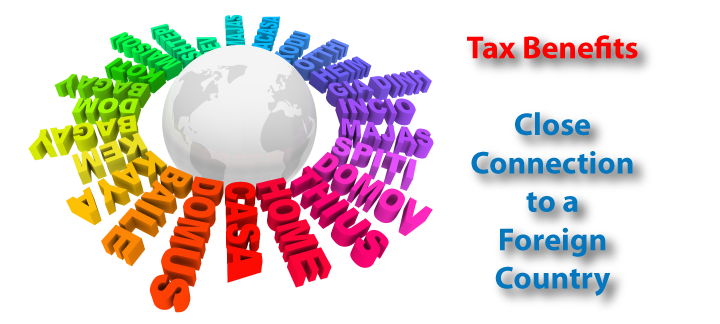Closer Connection to a Foreign Country
Non-US Citizens who meet the conditions of the substantial presence test, are considered to be a U.S. resident for U.S. international tax purposes. However, even if you qualify as a U.S. resident under the substantial presence test, you may be able to be treated as a nonresident alien for tax purposes if you can establish that you have a closer connection to a foreign country.
What is the Closer Connection to a Foreign Country Test?
This test serves as an additional exception to the substantial presence test. It allows you to be treated as a nonresident alien for tax purposes, even if you already satisfy the conditions to be treated as a U.S. resident under the substantial presence test. In essence, you do not need to be treated as a U.S. resident for tax purposes if you can show that you have a closer connection to a foreign country. (1).
What are the Requirements of the Closer Connection to a Foreign Country Test?
You can demonstrate that you have a closer connection to a foreign country if you: 1) Are present in the United States for less than 183 days during the calendar year; 2) Maintain a tax home in a foreign country during the calendar year; and 3) Have a closer connection to the foreign country in which you have the tax home during the calendar year.
In determining what constitutes a “closer connection” to a foreign country for these purposes, the IRS will look at whether you have maintained more significant contacts with the foreign country than with the United States. The IRS will consider the following evidence: 1) The country of residence you indicate on forms and other documents and 2) Whether you file any official documents, such as Form W-9, Form W-8BEN, or Form W-8ECI. The IRS will also consider the location of various important factors in your life, such as your permanent home; family; personal belongings (including your cars, furniture, clothing, and jewelry); your current social, religious, or professional associations; business activities; the jurisdiction in which you have a driver’s license; the jurisdiction in which you vote; and any charitable organizations to which you donate. (2).
What are the Steps Needed to Claim a Closer Connection to a Foreign Country?
In order to claim a closer connection to a foreign country, you must attach a completed Form 8840 to your tax return. (3).
Are there any Exceptions to the Closer Connection to a Foreign Country Test?
Yes, there may be exceptions to the Closer Connection to a Foreign Country test, and you may still be treated as a U.S. resident for tax purposes even if you qualify under the test. Specifically, you may not claim a closer connection to a foreign country if it is established that you personally applied, or took other steps, to change your U.S. status to that of a permanent U.S. resident during the calendar year. Another exception exists if you had an application pending for a change of status during the calendar year. In these scenarios, your desire to change your status to permanent U.S. resident shows that you have a close connection to the United States, and you will not be able to claim that you actually have a closer connection to another foreign country.
How a Tax Attorney Can Help with the Closer Connection to a Foreign Country Test
If you pass the substantial presence test, but believe that you may actually have a closer connection to a foreign country, you may need the assistance of a knowledgeable tax attorney to help you evaluate all aspects of your situation.
The Tax Lawyer - William D. Hartsock has been successfully helping clients comply with U.S. International Tax Laws and deal with issues related to worldwide taxation since the early 1980s. Mr. Hartsock offers free consultations with the full benefit and protections of attorney client privilege to help people clearly understand their situation and options based on the circumstances of their case. To schedule your free consultation simply fill out the contact form found on this page, or call (858) 481-4844.



Comments (0)